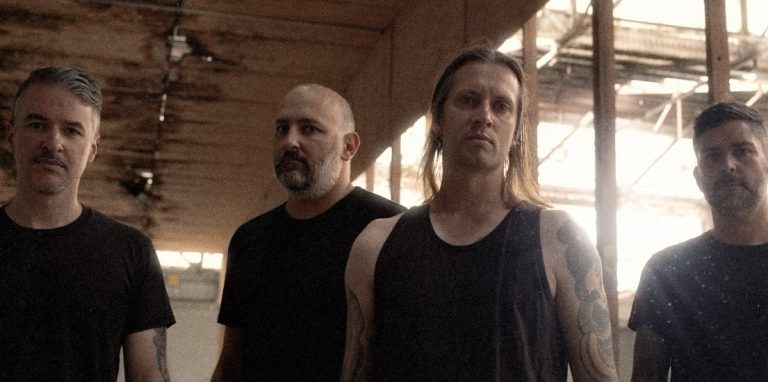Sydney sludge metal veterans Lo! gazed upon the world, saw widespread decay and destruction, and created one of the most thoughtful albums of the year.
The band’s new album, The Gleaners, released today, is concerned with weighty but necessary themes: they call out tyrannical power structures and societal subjugation, remaining defiant in the stern face of capitalism and colonialism, privilege and apathy.
The Gleaners may be a visceral ride into the darkened mire, but Lo! are sincere in searching for light, truth and freedom throughout.
“We created an album of anthems without losing the groove or viciousness of performing live, using defined characters and themes that are revisited and interwoven across the record, while also experimenting with atmospheric and cinematic samples to breathe life into the recording,” explains guitarist and songwriter Carl Whitebread.
With The Gleaners‘s brutal narratives being populated by several fascinating characters, Tone Deaf had to know more. You can read vocalist Sam Dillon’s breakdown of all of the album’s key concepts and characters below.
And if you want to hear the metal scene favourites play these tracks live, Lo! will be performing at Australia’s newest heavy music festival, A Cold Day In Brisbane, this July alongside some of the country’s finest heavy hitters in metal, rock and punk (tickets available here).
Lo!’s The Gleaners is out now via Pelagic Records.
Love Metal?
Get the latest Metal news, features, updates and giveaways straight to your inbox Learn more
The Gleaners Album Title and Concepts
The Gleaners is our fourth album and it heralds four core characters over nine tracks, all chained, link to link, after their choices. The act of “gleaning” was a medieval practice where a Lord or someone of nobility would allow their lowest subjects to sift through the refuse of the newly harvested field for substance and leftover grain. But this is seen as feigned mercy; it was actually there as a sign of shame or to lord it over your population.
Replace “grain” with “truth” and we ourselves are gleaning daily through media, relationships and our own myths to subside. We’re hoping to harvest some sense from the muck and the mire on this album; capitalism, colonialism, privilege, wholesale apathy and its dilution of our natural world all get their dues.
It’s consistent, unrelenting aggression. And it’s good to understand your place in the way things are weaponised or when you feel apathetic towards an issue. The more that we understand our position in things, the more we’re able to empathise with other people’s points of view. We can’t just exist separately from nature. We’re all part of it and that mechanism keeps going, and I feel that we should be leading things to be better rather than worse.
The Gleaners Characters
The way that I have lyrically approached the releases that I’ve done vocals on since 2015’s The Tongueless was to build core characters who would embody the sins or issues that are being illustrated. And as I moved into Vestigial in 2017, these became things like Locus Christ, Judas Steer, Gods of Ruin and The Worms Lament.
And then we were able to elaborate further on that in The Gleaners with Rat King, Caucasian Vulture, The Gleaner and White Worm Saviour. These are all very weighty themes and topics for me that I can explore, things like white privilege, colonialism, the fall of capitalism and having apathy to what is happening with local extinctions in our environment.
The Rat King
The Rat King has its drive from medieval imagery and also the poignant thing of human greed to do with the industrial revolution, because these are things that only ever happen as an answer to overdevelopment, and to too much progress and too much avarice. By illustrating that, it’s a very strong image, it lends itself to the metal genre and it’s something that always interests me to delve deeper into my research for writing lyrics.
Caucasian Vulture
The Caucasian Vulture that’s explored on tracks like “Cannibal Culture” and throughout the Gleaners cycle – it is what it says it is. We are picking away at the corpses of other cultures to survive. And rather than giving this back as a form of good, sometimes we do way more harm than necessary by not acknowledging what we’re eating, what we are consuming and in the nature that that’s put back into the world.
The Gleaner
The Gleaner is us as the mass underneath the 1% having to sift through the waste to be able to find a way to live. And how the more we are told that what we are being offered is all we should need, the more apathetic we are about change.
White Worm Saviour
The White Worm Saviour is, again, a bit self-explanatory. I was always interested in the idea of white worms, because in the Bible, white worm actually translates as maggots, in things from the Old Testament to things around the story of Judas. I find that we are still feeding off of ourselves and we are a representation of the decay in the system. And when you’re signal boosting or taking over the podium of someone else who knows the argument or who has the facts of that experience – we only diminish what is being said.





































